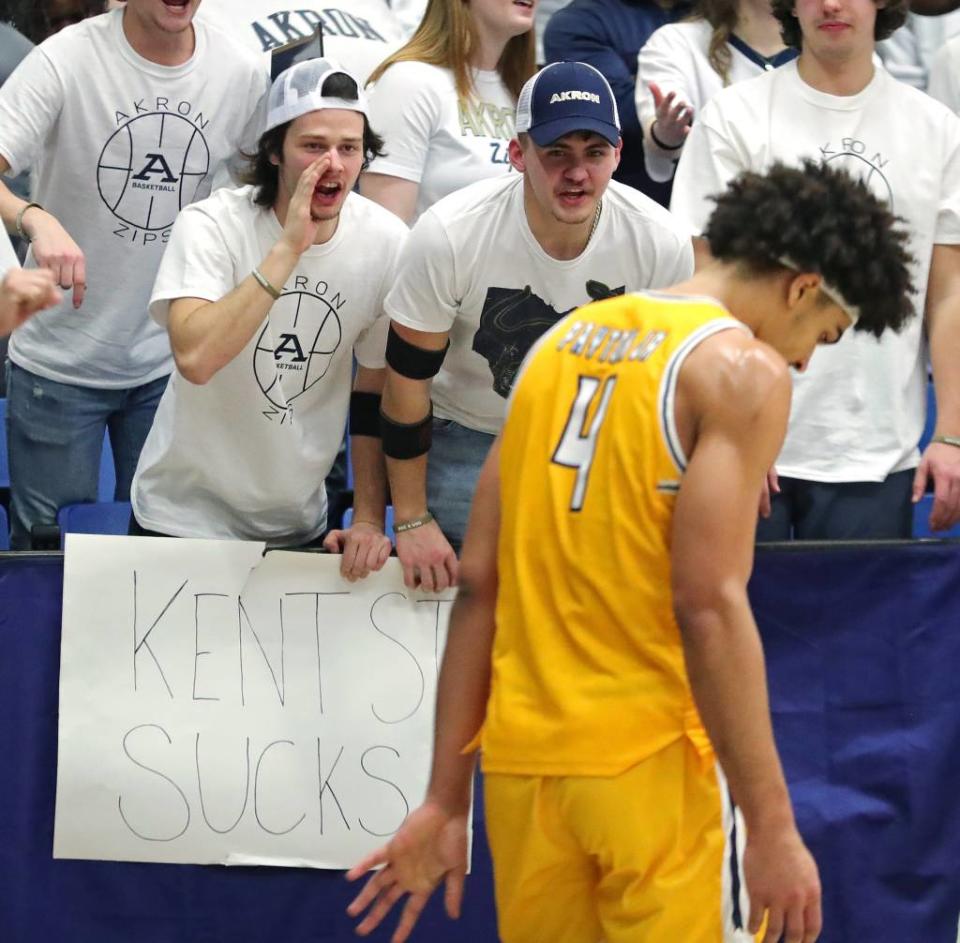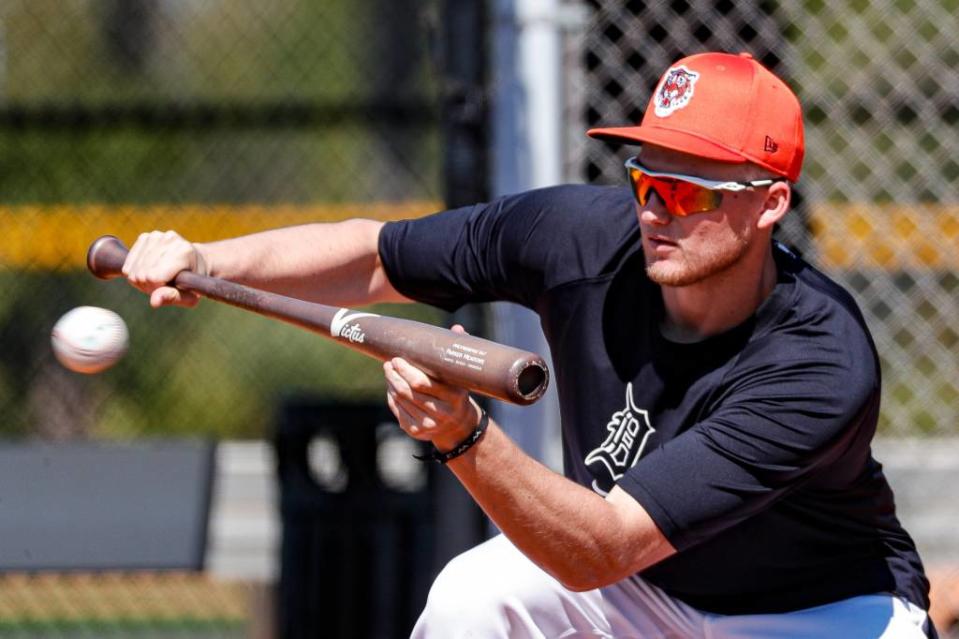Sports is falling victim to vulgar behavior, greedy overlords

- Oops!Something went wrong.Please try again later.
- Oops!Something went wrong.Please try again later.
Stop me if you’ve heard it: Man walks into a diner for breakfast. A waitress approaches. She’s scratching her rear end.
“Do you have hemorrhoids?” he asks.
“Whatever you see on the menu,” she answers.
Good morning. Thought for food:
1) Given the growing group incivilities at college basketball games — the vulgar taunts and chants, ignored and indulged as rites of passage and school spirit awaiting tradition — what would happen if refs quickly called technical fouls on the home team as a strong message to cut it out, and immediately?
You think it would increase or decrease antisocial group behavior? The key word in the question is “group,” as very few students would be inclined to sit or stand by himself to chant “F–k!” or holler any other excessively hostile and even threatening words for fear of being identified as mentally ill.
You think games would enjoy restored civility if the boldest, selfie-snapping fools in the live audience cost their school points from the foul line? You think nearby fans wouldn’t discourage their student-body brethren from further — or any — offensive demonstrations?
Peer pressure always has been a decisive factor in choosing right from wrong. They’d prefer a vandalized game to a good one? Or are they just there to do their worst for TV camera attention?
“See me on ESPN last night? I was one of those chanting ‘s–-t head!’ at the visiting coach and the refs. How cool is that?”

Beyond the obvious subjectively of “offensiveness,” such technical fouls also would lead to wishful rationalizations and protests that they punish free speech, even if the free speech is a vulgarity chanted in kids’ ears. We’ll let the Supreme Court handle that.
For now, those who consider themselves well-comported basketball fans, it’s worth a shot.
2) For 40 years I’ve been surrounded by golfers and golf fans — the kind who’d play 18 in the morning then watch a tournament on TV.
And nothing elevated their interest more than next month’s Masters. “Who do ya like in the Masters” was the most asked question, surpassing, “You really gonna make me putt that out?”
Last April, I sensed a wholesale change. Beyond gamblers, fewer seemed as interested in watching or discussing the Masters. Greed — the unrestrained kind — leading to top players’ departures for Saudi government oil money through LIV seemed the primary reason.
Few seemed to have been able to keep track or even care which operation they play for, why and for how much — beyond the fact that it’s no longer about money, but more about unfathomable government-sponsored, can’t-say-no greed. Even long-held rooting interests in individual players vanished behind dollar signs, Euros and Saudi Arabian Riyals.
Thus golf, no matter how much Jim Nantz recites romantic odes to the game’s sustaining beauty and its unshakable marriage to sports — with or without chirping of birds that don’t inhabit Augusta, Ga., — is headed where all sports seem eagerly headed: Down. Way down.
The lessons learned from unrestrained greed, beginning with the loss of boxing to pay-per-view-blinded promoters, remain unlearned.

How continued pay-per-privilege streaming — across multiple platforms to find the same amount of games a single cable subscription used to provide — will benefit MLB, the NFL or anything else beyond the shortest of terms seems wishful as pre-existing fans are becoming conditioned to live without rather than play this one-way money game.
What to do about it? Short of eliminating greed, nothing. Ah, but to be taken for granted still means being taken, and golf telecasts sponsored by Rolex and brokerage houses don’t jive with sucker audiences.
3) In 2020, the Nets fired coach Kenny Atkinson reportedly because he wasn’t a “players’ coach,” because he preferred to be the head coach as opposed to the head camp counselor.
The Nets, having recently fired Jacque Vaughn, now appear in great need of a take-charge, no-pandering head coach, someone like, say, Kenny Atkinson.
Baseball clubs routinely sabotage themselves
The opening of spring training often meant the opening of The Sporting News to read that every team in the majors was primed to win the pennant.
Locally, we inspected managers, batting orders, fielders and the backs of baseball cards to determine the immediate futures of the Yankees and Mets.
But we never had to consider fundamentals — how many games would be lost to an absence of the minimal demands of winning baseball. And we never had to weigh managers’ eagerness to lose games by removing effective pitchers based on analytics that portray relief pitchers — even the transient — as dependable, just-plug’em-in robots.
Never before were we forced to consider whether teams’ batters run, jog or walk to first as running the bases, despite the continued wearing of spikes, has become optional, a matter of personal preference.
Also now optional is getting an intentional late start to first — thus turning doubles into singles, or sliding outs at second. Standing and watching has become a matter of, “Well, he thought it was gone” when he only hoped it was gone.
And after the game most managers insult us — and The Game — with their transparently thin defenses of the indefensible.
So much we didn’t have to consider in the 1990s, 1980s, 1970s, 1960s and whenever we began to cherish baseball is now a significant part of the modern, backward equations:
Does the player know how to bunt? Does the manager believe in bunting and/or the hit-and-run — as if they’re spiritual commitments as opposed to an important teaching component that’s on the fade?

Does the outfielder know to find the cutoff man? Does the infielder know where to position himself to summon a cutoff? Why do batters swing so hard on 0-2 and 1-2 pitches? Do visiting outfielders any longer throw balls against the walls to gauge the ricochets? Or don’t they bother?
Based on mathematical probability rather than observable here-and-now reality: Do managers know or care that fundamentally sound teams and decisions can and will make losses into wins? How many over the course of a season? Who knows? Ten? Twelve? More?
These are all considerations we never had to consider 25 years ago and even back to when players weren’t paid $25 million to hit .210, strike out 125 times and spend weeks on the injured list for their inability to wisely run the bases — if they choose to run.
And all of it defies the easiest of cures: The resumption of fundamentally sound, winning baseball, the kind we were taught beginning at about, oh, 7 years old.
Networks interested in what’s on later, not now
Tuning in anything on NBC, from the “Today” show through “The Tonight Show,” is to invite visual and verbal assault by anything that sells NBC goods. Just like ESPN/Disney.
The relentless two-week sell of the Dolphins-Chiefs playoff game on NBC’s Peacock has been replaced by Summer and Winter Olympic sells. A recent “Today” segment promoted two female figure skaters identified as hopefuls to make the U.S. team — in 2026.
Exit velocity, when applied to desperately vapid and childish ESPN programming, can be supersonic. Wednesday, this heated debate: “Who would you rather have, LeBron James or Stephen Curry?” Zoom! To quote Michael Kay, “See ya!”

